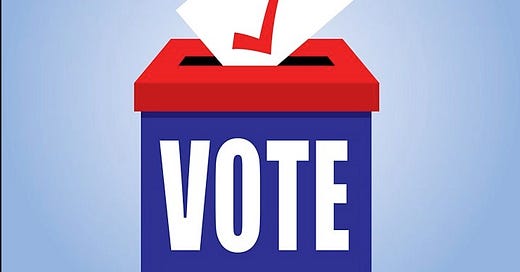Prior to 2020, I believed that US elections were free and fair and that we (the US) endeavored to export those “systems” to countries like Iraq and Afghanistan where purple fingers dipped in ink became a symbol of how we can administer something akin to US elections abroad. How naïve’!
Since 2020, I’ve had a crash course in voter rolls, registrations, electronic voting machines, precincts and voting processes because I’ve awakened to the incontrovertible fact that American elections do not adhere to the “free” nor “fair” standard. After retiring from the Army in 2022, I began serving as a county election judge to better understand “The Election Process.” As many veterans know, the best way to learn to fix a Byzantine, administrative process is by volunteering to run it rather than merely being a sideline critic. I’ve learned that many military skills are great training for election poll work such as having great organizational skills, making people quietly stand in a line, and then use frustratingly antiquated computer systems to achieve unceremonious outcomes for the user aside from participation; a civic duty and a devotion. Here are my top three reasons why veterans should consider this service.
Your community needs the help.
Election poll workers including clerks, judges, and poll watchers are volunteer positions upon which we base all elections; at least the portion that must engage directly with voters. Each serves a key role at each county voting location to ensure that the process of voting adheres to county and state law. Clerks check in voters who provide identification and verify registration; preparing them to go cast a ballot. Judges oversee the voting process and ensure that the polling setup (signs, machines, forms) is legal. Poll watchers observe, but do not function within, the voting process. Rather, poll watchers annotate adherence to (or deviations from) legal standards and communicate issues to the parties. Precinct committee chairs or captains are key players (and elected positions) who are fundamental to registration and increasing voting turnout. Poll workers and precinct chairs/captains work for the parties and are generally filled below 50%; a sad statistic reflective of our overall involvement. Judges and clerks, in my county, are temporary, paid county employees during the process of training and elections.
Positions you for election improvements
Patriotic Americans across the political spectrum have seen the issues with electronic voting machines as the proverbial “black box” where votes go to get counted, changed, multiplied, divided, or otherwise; a fact extending back to their inception after the 2000 Election (hanging chads?!). Poll workers see and understand the entirety of the voting process as the voter experiences it; the good, bad and ugly. I teach statistics and can attest to significant concerns over digital inputs and repositories of voters and votes. Military service taught veterans to navigate and master complex administrative systems to achieve relatively simple outcomes (TDY travel or just filing for leave are two examples). Voting is to the public what a battalion wide urinalysis is to the Army; sometimes a lot of work without much, if any, benefits. You’re giving a little bit of yourself and are either unconcerned or a bit worried about what happens later. Such is voting to most Americans. If we want the outcomes to improve, focus on the process.
Continues your service
Veterans serving locally in county elections positions add critical experience and strength to fragmented electoral processes. You’re generally a person who can be counted on as reliable, capable, and level-headed making you, a veteran, a welcomed stabilizing force in a process under growing, but necessary scrutiny. My wife and I served together for the 2022 Midterm elections and thoroughly enjoyed meeting people from central Texas and connecting with the America that we’ve served. One elderly Korean War veteran in a wheelchair came into our polling location and, as the judge, it was my responsibility to see to it that he received mobility assistance or careful instructions on working the machine controls. He told me that, despite his wheelchair, he would never vote by mail and as long as he lived he would “always come in to vote because the nation means that much to me!” Yes, sir!
Veteran involvement in election work elevates the standard for others in our community and can serve to encourage civilians to pick up their share of caring for the community and the nation. As a rookie election judge, I have a lot to learn in how to serve outside the military but am confident that the same good attitude and resilience that most veterans have can inspire election system improvements that will benefit all Americans. As an officer, it’s important to get the “ground truth” and participate in the tedious work underneath critical outcomes of complex elections (no UA tests, thanks). Although I was naïve’ about the true state of our shaky and untrustworthy electoral systems, I’m now grateful that I’ve found a new way to apply old Army skills and improve an electoral system we all rely upon— no matter your political affiliations.
Colonel (ret) Theodore Croy PhD is a professor and physical therapist who lives near Waco TX in McLennan County. He retired in 2022 after over 30 years of military service and continues to teach master’s and doctoral students in allied health sciences. Email: tcroypt@gmail.com



